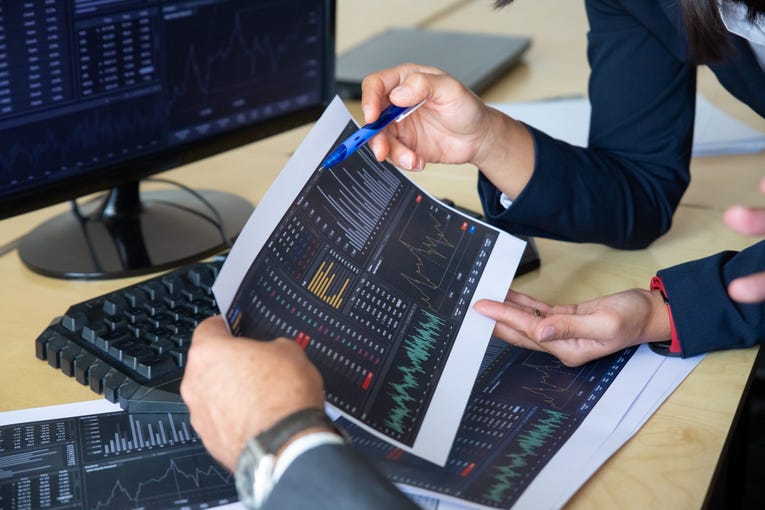Investing on a global scale is not without its challenges. The challenges include converting between languages and currencies, as well as dealing with foreign exchange and regulations.
Nevertheless, the vast majority of financial experts recommend including at least some international companies in a diversified portfolio.
There are some simple ways to invest in overseas markets that do not require learning a new language or exchanging dollars for euros. These ways include: Find out how to diversify your holdings with stocks and funds that are traded in the United States, along with some helpful hints on how to do it the proper way.
Purchasing exchange-traded funds (ETFs) or mutual funds that carry a basket of worldwide equities and bonds is the simplest and most common way to invest in international markets. This is also the most popular method.
These two types of funds enable you to quickly add a highly diversified international component to your portfolio through a single transaction that gives you access to overseas assets in a variety of industries and countries across the globe.
You also have access to a wide variety of mutual funds and exchange-traded funds, such as the following:
The investments made by international funds are dispersed throughout a large number of nations other than the United States.
Regional funds are investments that are made in certain geographical areas, such as Europe, Asia, or the Middle East.
Country Funds are investments that are made in individual nations, such as Spain or Russia.
A good example of a sector fund would be one that invests in the energy or telecom industries across various countries.
How to Identify the Most Appropriate Investment for Your Portfolio
Which kind of investment account works best for you? The answer to that question depends on the goals you have for your investments and the level of risk you are willing to take.
In general, mutual funds are managed actively by professional investors, whereas exchange-traded funds (ETFs) are managed passively, with holdings based on an already established index. Because of this, mutual funds typically have higher expenses compared to their counterparts that are passively managed.
After deciding which kind of fund is best for your needs, the next step is to select a country or region in which to put your money to work.
The majority of financial counselors suggest that younger investors go for funds with a higher risk and the potential for greater profits, while they recommend that older investors look for funds with lower risk and more stability.
This frequently translates to increased exposure to emerging markets for younger investors and increased exposure to developed markets for more experienced investors.
Utilizing free web tools such as the Yahoo! Finance Fund Screener or the Wall Street Journal Fund Screener is the most efficient method for locating specific mutual funds.
In the meantime, exchange-traded funds (ETFs) can be discovered by searching the websites of some of the top ETF providers, such as iShares or SPDRs. In the end, investors should look for funds that fulfill their investment goals while also satisfying their appetite for risk and that have minimal costs and good returns.
ADRs make it easy to buy individual stocks listed in foreign markets.
Consider looking at American Depository Receipts if you are more comfortable with a hands-on strategy (ADRs). These are financial instruments that are traded in the United States but represent ownership in the shares of firms based in other countries.
ADRs do not require any complicated currency conversions or foreign exchange transactions because they are denominated in dollars and can be traded on any of the three major stock exchanges in the United States: AMEX NYSE, and NASDAQ.
The fact that many overseas stocks can't be bought as American Depositary Receipts (ADRs) is a drawback. These stocks can only be purchased on international stock markets like the Toronto Stock Exchange (TSE) in Canada or the London Stock Exchange (LSE) in Europe.
Even though some overseas brokers, like InteractiveBrokers, provide a low-cost method for purchasing these stocks, you should still verify the fees thoroughly before engaging in any trading.
When compared to normally marketable equities on the exchange, the liquidity risk associated with ADRs is larger. Another important consideration to keep in mind is that holder of unsponsored ADRs are not granted any voting rights.
The purchase and sale of ADRs take place in U.S. dollars. However, any dividends that are distributed will be denominated in foreign currency at the time of issuance and then converted into U.S. dollars at the time of distribution.
As a direct consequence of this, there is a possibility that the currency exchange rate will be exposed in certain scenarios. There is also the possibility that dividends are subject to taxes in a foreign country.
Where to Look for Opportunities in International ADRs
In the same way that investors should choose international funds based on their investment objectives, they should also choose individual equities based on their comfort level with risk.
Larger, more established firms using ADRs, such as Sanofi-Aventis SA (NYSE: SNY) or Rio Tinto plc, are good options for investors who are seeking relatively secure bets (NYSE: RIO). If, on the other hand, you are willing to take on a higher level of risk, you can find more undervalued chances in smaller ADRs.
When searching for individual ADRs, you should use the same stock screeners that you use to identify individual U.S. equities. Finviz's stock screener is widely regarded as one of the web's most effective and user-friendly free stock screeners. It gives users the option to screen companies based on a large variety of different parameters.
The Crux of the Matter
International funds and American depositary receipts (ADRs) are excellent strategies to build global exposure into any portfolio without the need to be concerned with foreign equities or restrictions in those companies' home countries. If you keep the aforementioned advice in mind, you will be well on your way to diversifying your portfolio.


